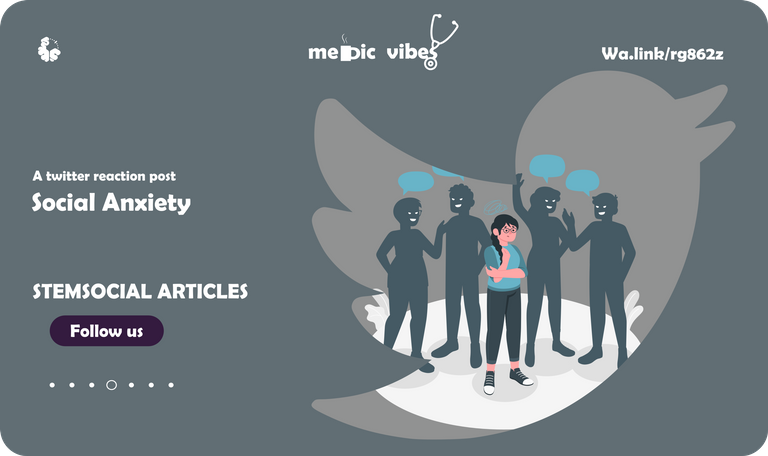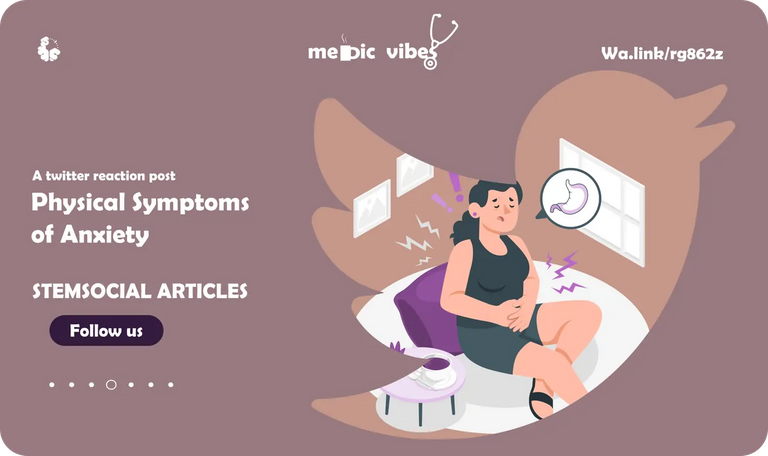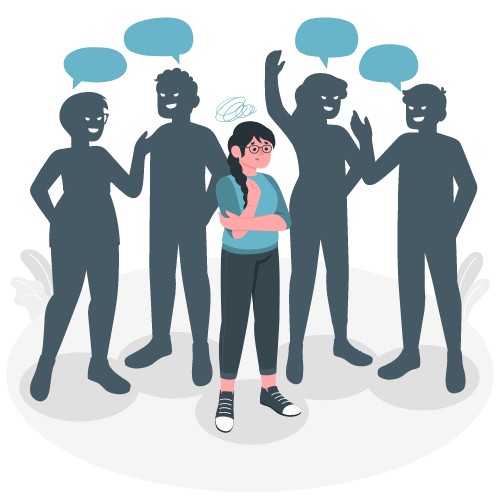Social Anxiety (A Twitter Reaction Post)

Depression vector created by pch.vector - www.freepik.com and Inkscape.org
starting my first tour tonight and i have social anxiety, so if ur in the audience please turn around and don’t look at me.
— NASARATI (@LilNasX) September 6, 2022
In the last post, we looked at the physical symptoms of anxiety, how these symptoms evolve and how they affect daily life. We looked at a detailed post by Healthline that gave these explanations.

In the article, they explain that these physical symptoms are due to hormonal secretions that are accompanied by these attacks. In a panic attack, the person could be having an increased heart rate and increased breathing rate. These are responses that are related to the fight and flight mechanism of the sympathetic system.
The post describes pain symptoms that are associated with a panic attack and they can be related to the sustained tensing of the muscles associated with these attacks.
The hormones that were found to be responsible were adrenalin and cortisol. Adrenaline causes short-term changes while cortisol is a stress hormone that in the long term can have its adverse effects.
In this post, we are going to examine social anxiety and find out more about the symptoms and build knowledge about its management. If you would like to know more about this topic keep reading.
Welcome to our blog here at Medic Vibes, We are Mental health blog, being headed by Dr Ebingo Kigigha, a medical doctor and illustrator. His articles in Medic Vibes are posted on Stemsocial. Last month we looked at depression starting from a study done in Nigeria to tweets related to depression and ended it with a summary of the whole topic. This month is all about anxiety and we have looked at a study that saw a 50% prevalence among youth in a national camp. Right now were are taking tweets related to anxiety.
Anxiety disorders are characterised by fear and worry. They are a group of disorders and are more common in younger people than in the older population. In a crossectional study, we saw that anxiety in a National youth camp was as high as 50% in prevalence. 3% of people in the world suffer from anxiety yearly according to global estimates. In Nigeria, the disorder affects up to 1% of people.
The anxiety issue is that everyday life experiences cause worry to the person affected by anxiety. Being anxious, about your exams or school performance is normal. The criteria for anxiety is that has to present on most days for 6 months.
Everyone experiences anxiety in their life. If you have ever written a test where stakes are high or you have performed on stage then you know the feeling of having your heart racing, palms sweating and breathing fast that usually comes with it. The problem with anxiety disorders is that the features described are experienced on a normal day. Take Obsessive Compulsive Disorder OCD for example, I’m sure you sometimes go to check the doors if they are locked before going to sleep and sometimes you might go back to check it again, but with there is the constant fear and worry that goes on and affect the person’s sleep and it happens almost every day.
Yesterday we discussed some groups of symptoms such as abdominal pain, chest pains, fast breathing, headaches, palpitations and others experienced by those with anxiety disorders.
Some other symptoms a person with anxiety can have are related to memory such as remembering a traumatic event, and having difficulty sleeping because of traumatic events all related to Post Traumatic Stress Disorder.
Abnormal reactions like being bothered about certain situations can also affect those dealing with anxiety.
According to the Diagnostic and Statistical Manual, anxiety has to be about different things. The symptoms are present for most parts of the 6 months. The worry is difficult to control and is usually about different issues. These symptoms are in addition to symptoms such as pain symptoms difficulty concentrating, tiredness, restlessness, and insomnia. One of these symptoms in the last sentence is always present in children.
As we have seen in the post about Post Traumatic Stress Disorder and flashbacks, anxiety is a risk factor for depression and can later progress to suicidal ideations. Read my posts on depression to know more about depression and the warning signs.
Social Anxiety

<asignificantlyhttps://storyset.com/people">People illustrator rations by Storyrelationshipe
Those who have social anxiety feel worried or afraid about social gatherings and can avoid meeting new people, or talking to people for the reason that they may be judged.
This can greatly affect a person's ability to go to work, or school or start a relationship with people.
People suffering from social anxiety can have physical symptoms such as jittery, nausea, tachycardia, speaking difficulty and sweating excessively
Some psychological symptoms that a person with social anxiety can experience include being bothered about everyday events like classes, or occasions, and trying not to be noticed at events. They sometimes can be dependent on alcohol.
The main reactionary symptom that those with social anxiety can have are avoidance symptoms.
Healthline's post by Valencia Higuera reviewed by Timothy J. Legg, PhD, PsyD explained that the causes of social anxiety can be genetic and have been found to run in some families, social anxiety can be caused by certain experiences such as bullying, sexual abuse or emotional abuse.
Tips
Treatment includes pharmacotherapy prescribed typically by the doctor and psychotherapy. Cognitive Behavioural Therapy can be used to help people deal with psychological problems. In addition, there is a specific therapy that those who are dealing with social therapy called Avoidance therapy.
Hive stories
@giantbear talks about how his friend past away recently and how they faced anxiety dealing with the issue. As a final thought, they decide to give everything to the hand of God. Check out their post here to read more
I have written before about how food is a good tool to help deal with anxiety.
Check out her post here
Questions
- What did you learn about physical symptoms of social anxiety?
- What did you learn about anxiety?
- What methods are used for the treatment of social anxiety?
Conclusion
Social anxiety is related to social events, or gatherings. People dealing with this type of anxiety can show symptoms related to meeting new people, going to occasions, planning events and other things that have to do with other people.
Thanks for your contribution to the STEMsocial community. Feel free to join us on discord to get to know the rest of us!
Please consider delegating to the @stemsocial account (85% of the curation rewards are returned).
You may also include @stemsocial as a beneficiary of the rewards of this post to get a stronger support.
Holiss.
Me parece muy interesante tu enfoque y la manera tan entretenida ae interesante que nos vas presentando la información. Realmente expones las consecuencias fisicas, emocionales y de realación que se producen como consecuencia de la ansiedad social.
gracias, me alegra que te haya gustado
I could not image that people could get sick just with the idea of meeting others. I don't envy those people at all!
Cheers,
PS: I will never stop being surprised by human behaviours.
Its just different strokes for different folks. As our faces are different so are our problems.
It very painful when you think about it. Most of them are aware of the problems they are facing.
Being aware of a problem is always a good step in trying to fix it. That's not too bad, I could imagine.
Yeah...usually the first step to fixing anything.